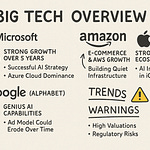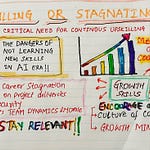Welcome to Sridhar’s newsletter & Podcast (Click Play button for Audio version of the Post). Appreciate you being here, so we can connect weekly on interesting topics. Add your email id here to get this directly to your inbox.
Do subscribe to show Minimalist Techie over Apple Or Spotify Or YouTube podcast (Click on Hyperlinks for Apple Or on Spotify Or on YouTube) or hear it over email you received through my subscription or on my website.
This weekly newsletter is mostly about the article, books, videos etc. I read or watch or my views on different topics which revolves around my head during the week.
Lets dive into todays topic.
Handling Frustrations When Your Expertise is Dismissed in the Workplace
In today’s episode, where we’ll dive into an issue that I know many of us have faced at some point in our professional lives—what to do when your expertise is repeatedly dismissed or undervalued, especially in a collaborative team environment. If you’ve ever found yourself in situations where your logical, well-reasoned inputs were ignored, or where it feels like egos and inefficiencies are draining your energy, this episode is for you.
We’re going to explore why these situations happen, why they feel so frustrating, and, most importantly, how to handle them in a way that protects your peace of mind and allows you to continue excelling in your role. By the end of this episode, I hope to give you not just perspective, but actionable strategies to navigate these challenges. Let’s dive in.
Why Does This Happen?
Let’s start with an honest question: Why do some people resist ideas that clearly make sense? Why do teams waste time debating over points that seem obvious? While every situation is unique, there are a few common factors at play:
Ego-Driven Decision-Making
Sometimes, people resist ideas not because they’re bad, but because those ideas didn’t come from them. They may feel a need to validate their authority or assert their control over a situation. Unfortunately, this often leads to inefficiencies, like reinventing the wheel instead of using a proven solution.
Lack of Technical Expertise
In some cases, the people making decisions may not fully understand the technical implications of their choices. For example, they might favor unnecessarily complex solutions or dismiss simpler, more efficient options because they don’t grasp the long-term impact.
Resistance to Collaboration
When people view feedback or alternative ideas as a challenge to their position rather than as an opportunity for collaboration, it creates resistance. This can be especially frustrating when you’re trying to contribute constructively.
Fear of Accountability
People sometimes feel safer creating their own solution, even if it’s less efficient, because they feel more in control of the outcome. They may see leveraging existing tools or recommendations as tying them to someone else’s work—and they fear being held accountable if something goes wrong.
Habitual Behavior
Teams often fall into patterns where collaboration is lopsided. If a team is used to making decisions without fully considering inputs from other stakeholders, it can be difficult to break that habit.
Why Does This Frustrate Us?
Now, let’s talk about why this kind of behavior can feel so deeply frustrating, even for the most patient among us.
You Feel Undervalued
When your expertise is repeatedly dismissed, it can feel like your skills and contributions aren’t appreciated. It’s disheartening to put in the effort to offer well-reasoned advice, only for it to be ignored.
Wasted Time and Energy
Watching a team implement an inefficient or suboptimal solution, knowing that your recommendation would have saved time and effort, can feel demoralizing. It’s especially hard when the outcome eventually aligns with what you originally suggested—but only after unnecessary delays and wasted energy.
Added Stress and Workload
When decisions are made poorly, it often falls on you to clean up the mess later. This added stress and workload can quickly lead to burnout, especially when it feels like these situations are preventable.
You Care About the Outcome
The frustration isn’t just about being right. It’s about wanting what’s best for the team, the project, and the business. When poor decisions compromise efficiency or quality, it impacts everyone—including you—and that can be hard to watch.
How to Handle These Situations
So, how do you deal with these challenges in a constructive way? Let’s break it down into a few actionable strategies:
Document Everything
When you share recommendations or raise concerns, make sure they’re documented. Whether it’s in an email, a meeting recap, or project documentation, write down what you suggested, why you suggested it, and the potential risks of ignoring it. This not only protects you but also provides a reference point if issues arise later.
Stay Professional, Not Emotional
It’s easy to get frustrated or feel like giving up, but staying calm and professional is key. Focus on presenting your points logically and factually, without letting emotions take over. Remember, the goal is to improve outcomes, not to “win” an argument.
Collaborate and Build Relationships
Sometimes, resistance comes from a lack of trust or understanding. Take the time to build relationships with your team members, especially those who are resistant to your inputs. Have one-on-one conversations to understand their perspectives and find common ground. Over time, this can lead to more collaborative and respectful dynamics.
Pick Your Battles
Not every issue is worth fighting over. Learn to prioritize which battles are most important to the success of the project or the team. For smaller issues, it might be better to let others take ownership of their decisions—even if you disagree—so you can save your energy for the bigger challenges.
Escalate Constructively
If resistance becomes a recurring issue that impacts the team’s efficiency or deliverables, don’t be afraid to escalate the situation to leadership. Frame the escalation as an opportunity for process improvement rather than as a complaint about specific individuals. For example, suggest creating a more collaborative decision-making process that involves all stakeholders upfront.
Let Consequences Speak for Themselves
In some cases, the best way to address resistance is to let others experience the consequences of their decisions. If their approach leads to delays, inefficiencies, or bugs, use that as a learning opportunity to demonstrate the value of your recommendations. Over time, this can help shift perspectives.
Protect Your Energy
At the end of the day, you can’t fix everything or force others to see things your way. Focus on doing your part—sharing your insights, providing logical recommendations, and documenting your efforts—and let go of outcomes you can’t control. Protect your energy by recognizing what’s within your influence and what isn’t.
Why Do People Behave This Way?
Let’s step back and consider the underlying reasons why people might resist your expertise:
Insecurity
They might feel threatened by your knowledge or fear losing control of the situation. This often manifests as resistance to input, even when it’s logical.
Fear of Change
People often prefer to stick with what’s familiar, even if it’s less efficient. Change can feel risky, and some individuals may be unwilling to take that risk.
Miscommunication
Sometimes, resistance stems from a misunderstanding of what you’re suggesting. Taking the time to clarify your points and address concerns can help reduce pushback.
These challenges are not unique to you—they’re something many professionals face in collaborative environments. The key is to focus on what you can control: your professionalism, your communication, and your ability to document and escalate when necessary.
Remember, your goal isn’t to "win" every debate—it’s to contribute to the team’s success while maintaining your own peace of mind. By approaching these situations with patience, professionalism, and a focus on collaboration, you can continue to excel in your role while minimizing frustration.
That is all for this week. See you again.
Do let me know in comments or reply me over email to share what is your view on this post. So, Share, Like, subscribe whatever these days’ kids say :-)
Stay Connected, Share Ideas, Spread Happiness.











